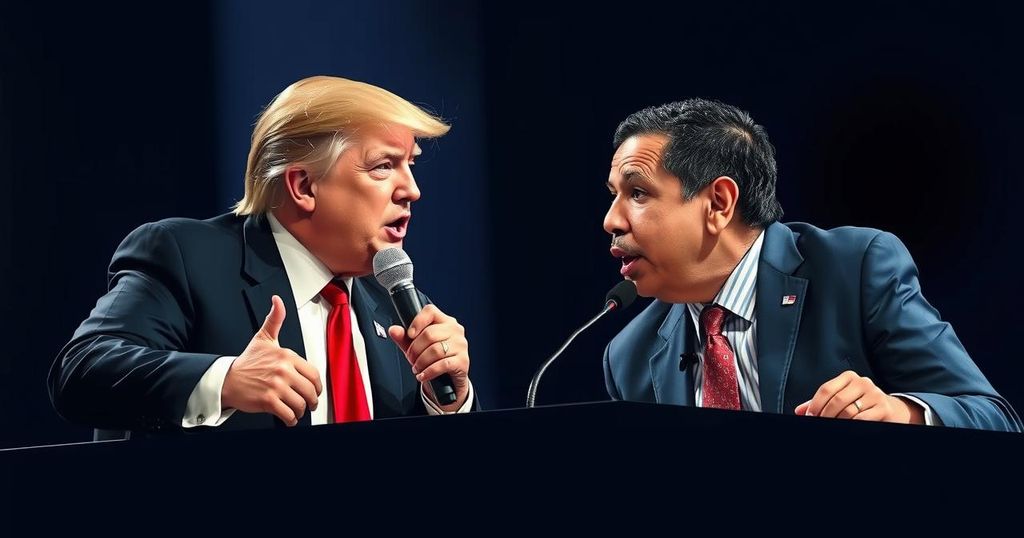Donald Trump’s campaign faces fallout from comedian Tony Hinchcliffe’s derogatory remarks about Puerto Rico, raising concerns about their impact on the upcoming presidential election. The backlash has garnered attention from prominent Puerto Rican figures and may influence voter turnout in critical battleground states, highlighting the sensitivity of such comments among diverse communities. Political analysts suggest these remarks could jeopardize Trump’s standing in the election, emphasizing the importance of the Puerto Rican vote.
During a recent rally at Madison Square Garden, Donald Trump faced significant controversy stemming from comedian Tony Hinchcliffe’s inappropriate remarks regarding Puerto Rico. Hinchcliffe referred to Puerto Rico as a “floating island of garbage,” eliciting swift condemnation from both Democratic and Republican circles. Danielle Alvarez, a senior adviser on Trump’s campaign, addressed the situation by clarifying that such comments do not align with the views of President Trump or his campaign team. The fallout from these remarks has mobilized prominent Puerto Rican figures, including rapper Bad Bunny and singer Ricky Martin, who have since expressed their support for Vice President Kamala Harris on social media. The timing of Hinchcliffe’s comments raises concerns about their potential impact on the outcome of the upcoming presidential election. With early voting already underway and approximately 5.8 million individuals of Puerto Rican heritage residing in the United States, including in key battleground states, Trump’s campaign could face significant repercussions. Mark Shanahan, a political science expert at the University of Surrey, suggested that Hinchcliffe’s “joke” may haunt Trump, potentially influencing voter sentiment in crucial states. The demographic’s feelings toward such statements could motivate voter turnout and sway undecided electors. For instance, in Pennsylvania, where there are about 472,213 Puerto Ricans, the previous election was decided by only 80,555 votes. Moreover, Hinchcliffe’s remarks could resonate in Florida, home to the largest population of Puerto Ricans in the U.S. at approximately 1.1 million. Local Republican officials, including Senator Rick Scott, have publicly denounced Hinchcliffe’s comments, emphasizing the need to respect and uplift Puerto Rican citizens. Polls indicate that while Trump holds a lead in Florida, the implications of such remarks, coupled with the historic voting trends of Puerto Ricans, may significantly influence electoral outcomes. Political analysts observe that elections are often decided by narrow margins, indicating that even minor comments can have a substantial effect on voter behavior as the election approaches.
The ongoing discourse surrounding Donald Trump and his approach to various demographic groups has intensified as the countdown to the presidential election continues. Puerto Rico, a U.S. territory with a significant population both on the island and within the U.S. mainland, holds substantial political importance during elections. The comments by Tony Hinchcliffe serve as a reminder of the sensitivity surrounding such discussions, particularly within the context of Trump’s previous interactions with minority communities. As the election approaches, the role of public perception among Puerto Ricans and other ethnic groups becomes increasingly critical in anticipating voter turnout and electoral results. Historical contexts, such as the significant 2016 election events, illustrate how seemingly insignificant remarks can alter the trajectory of a campaign.
In summary, the backlash against Tony Hinchcliffe’s derogatory comments about Puerto Rico has taken center stage, prompting reflections on the potential political ramifications for Donald Trump as the presidential election nears. With influential Puerto Rican figures rallying against such statements and political experts voicing concerns over voter impact in battleground states, Trump’s campaign must navigate the significant implications of public sentiment. The unfolding scenario presents an October Surprise that could very well influence the direction of the electoral landscape in critical states.
Original Source: www.newsweek.com






